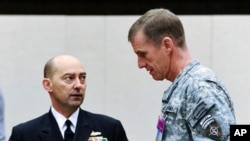The commander of all NATO forces says he is more concerned about his troops in Afghanistan earning the support of the Afghan people and building the size and competence of their security forces than he is about defeating Taliban forces in battle.
U.S. Navy Admiral James Stavridis spoke to VOA Pentagon Correspondent Al Pessin during a visit to Washington.
Admiral Stavridis says when President Barack Obama reviews his new Afghanistan strategy late this year, the key factors will not be related to the number of battles won or enemy fighters killed.
"I would look for polling data that continues to show significant support for the coalition and very small support for the Taliban. Secondly, I would look at the numbers of Afghan security forces. Thirdly, I would look at the quality of the operations conducted by the Afghan security forces," he said.
The admiral notes that a recent poll done for American, British and German news organizations shows a sharp increase in support for the Afghan government and NATO forces, compared to the same group's results a year ago. He says a key goal is for that trend to continue, and he says that means, in part, that the Afghan government must fight corruption and improve services to its people.
Most of the U.S. and international forces in Afghanistan fall under the admiral's NATO command, led in Kabul by General Stanley McChrystal. Admiral Stavridis says defeating Taliban units, taking control of more parts of the country and other traditional military measurements are important, but not as important in Afghanistan as many people think.
"I would say they fall below the level of importance of the things that I have listed. In any type of operation like this, we have to put the Afghan people at the center of gravity. If we take care of the Afghan people, the Taliban will fail," he said.
Admiral Stavridis, who took command of NATO forces worldwide in June, says that will involve efforts by international civilians, as well as military forces. And he says understanding the Afghan people is a key to his strategic view.
The admiral says he has not read a stinging criticism of past U.S. and NATO intelligence gathering in Afghanistan, published last week by his top intelligence officer in the country. But he indicated his priorities coincide with what Major General Michael Flynn wrote.
Admiral Stavridis says the Afghan people, rather than the Taliban, need to be the central focus of the allied intelligence effort, and he wants to use the varied expertise of NATO member countries to learn as much as possible about how the Afghans live, and what they need and want. And he says one more thing is crucial.
"We need speed, Al. We have got to do this fast. Not because a clock is ticking, but because the 'coin of the realm' is accelerating your knowledge to be inside your opponent's decision and knowledge loop," he said.
The admiral appears to be referring to what the intelligence officer, Major General Flynn, called the importance of solid information to enable senior commanders to "outsmart" the enemy.
Admiral Stavridis also said NATO member nations, which have been somewhat more willing to commit combat forces and trainers to Afghanistan in recent months, need to be prepared for more casualties as troop numbers and operations ramp up in the coming months.
"We must not be fearful of casualties if we're going to accomplish our mission. We simply need to do our mission in a way that reduces them to the absolute minimum," he said. "So we focus on IEDs [Improvised Explosive Devices], we focus on intelligent tactics, we focus on our own use of intelligence. But we are going to go forward, we are going to work with our civilian partners. And I am confident that our military leadership will be successful in their approach," said Stavridis.
The Afghanistan war is not popular in many European NATO member nations, and some of their governments find it politically difficult to send troops, particularly when casualties go up.
The admiral also repeated the U.S. military's endorsement of Pakistan's increased operations against the Taliban, al-Qaida and associated groups on its side of the Afghanistan border. But he would not comment in detail on the impact of those operations on the insurgents' ability to operate inside Afghanistan.
"Could more be done? Perhaps. Those are decisions the Pakistanis have to make. What I am very satisfied with is the interaction between General McChrystal and General [Ashfaq] Kiyani, who is the head of the Pakistani military," he said. "They are meeting, they are in contact, they are in dialogue about those operations. I do not want to get into specifics for a variety of obvious reasons. But I am very comfortable with the cooperation between ISAF and the Pakistani military on the other side of the border," he concluded.
Admiral Stavridis expressed confidence that the international community can defeat the Taliban in Afghanistan. But he said it will require a comprehensive approach involving civilian efforts as well as military force, and he expects that to be the focus of the London Conference on Afghanistan at the end of this month.





